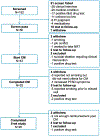Contingency management and cognitive behavioral therapy for trauma-exposed smokers with and without posttraumatic stress disorder
- PMID: 30391774
- PMCID: PMC6324961
- DOI: 10.1016/j.addbeh.2018.10.042
Contingency management and cognitive behavioral therapy for trauma-exposed smokers with and without posttraumatic stress disorder
Abstract
Introduction: Trauma-exposed individuals with and without posttraumatic stress disorder (PTSD) are more likely to smoke and less successful in quit attempts than individuals without psychopathology. Contingency management (CM) techniques (i.e., incentives for abstinence) have demonstrable efficacy for smoking cessation in some populations with psychopathology, but have not been well tested in PTSD. This pilot study examined the feasibility of CM plus brief cognitive behavioral therapy (CBT) in promoting smoking cessation among trauma-exposed individuals with and without PTSD.
Methods: Fifty trauma-exposed smokers (18 with PTSD) were asked to abstain from tobacco and nicotine replacement therapy for one month. During week one of cessation, CBT was provided daily and increasing CM stipends were paid for each continuous day of biochemically-verified abstinence; CM stipends were withheld in response to smoking lapses and reset to the initial payment level upon abstinence resumption. CBT and fixed payments for study visits were provided during the subsequent three weeks.
Results: Of the 50 eligible participants who attended at least one pre-quit visit (49% female, 35% current PTSD), 43 (86%) attended the first post-quit study visit, 32 (64%) completed the first week of CM/CBT treatment, and 26 (52%) completed the study. Post-quit seven-day point prevalence abstinence rates for participants with and without PTSD, respectively, were similar: 39% vs. 38% (1 week), 33% vs. 28% (2 weeks), 22% vs. 19% (3 weeks), and 22% vs. 13% (4 weeks).
Conclusions: Use of CM + CBT to support tobacco abstinence is a promising intervention for trauma-exposed smokers with and without PTSD.
Keywords: Contingency management; Post-traumatic; Psychological trauma; Stress disorders; Tobacco use cessation; Tobacco use disorder.
Copyright © 2018 Elsevier Ltd. All rights reserved.
Conflict of interest statement
DECLARATION OF INTERESTS
Dr. Rasmusson has been a paid consultant to Resilience Therapeutics and Cohen Veterans Bioscience over the past three years. The authors otherwise declare that there are no potential conflicts of interest to report. The views expressed in this article are those of the authors and do not necessarily reflect the position or policy of the Department of Veterans Affairs or the United States government.
Conflict of Interest
The authors declare that there are no conflicts of interest.
Similar articles
-
A Preliminary Investigation of a Relapse Prevention Mobile Application to Maintain Smoking Abstinence Among Individuals With Posttraumatic Stress Disorder.J Dual Diagn. 2017 Jan-Mar;13(1):15-20. doi: 10.1080/15504263.2016.1267828. Epub 2016 Dec 5. J Dual Diagn. 2017. PMID: 27918881 Free PMC article.
-
Mobile contingency management as an adjunctive smoking cessation treatment for smokers with posttraumatic stress disorder.Nicotine Tob Res. 2013 Nov;15(11):1934-8. doi: 10.1093/ntr/ntt060. Epub 2013 May 3. Nicotine Tob Res. 2013. PMID: 23645606 Free PMC article. Clinical Trial.
-
Supplemental nicotine preloading for smoking cessation in posttraumatic stress disorder: Results from a randomized controlled trial.Addict Behav. 2016 Aug;59:24-9. doi: 10.1016/j.addbeh.2016.03.004. Epub 2016 Mar 11. Addict Behav. 2016. PMID: 27046670 Free PMC article. Clinical Trial.
-
Posttraumatic stress disorder and cigarette smoking: A systematic review.Depress Anxiety. 2018 Nov;35(11):1056-1072. doi: 10.1002/da.22828. Epub 2018 Sep 7. Depress Anxiety. 2018. PMID: 30192425
-
Co-occurring tobacco use and posttraumatic stress disorder: Smoking cessation treatment implications.Am J Addict. 2015 Dec;24(8):695-704. doi: 10.1111/ajad.12304. Epub 2015 Nov 19. Am J Addict. 2015. PMID: 26584242 Review.
Cited by
-
Cognitive Behavioral and Mindfulness-Based Interventions for Smoking Cessation: a Review of the Recent Literature.Curr Oncol Rep. 2020 May 16;22(6):58. doi: 10.1007/s11912-020-00915-w. Curr Oncol Rep. 2020. PMID: 32415381 Free PMC article. Review.
-
Tobacco use, trauma exposure and PTSD: a systematic review.Health Psychol Rev. 2024 Dec;18(4):649-680. doi: 10.1080/17437199.2024.2330896. Epub 2024 May 6. Health Psychol Rev. 2024. PMID: 38711288
-
Smoking and bladder cancer: insights into pathogenesis and public health implications from a bibliometric analysis (1999-2023).Subst Abuse Treat Prev Policy. 2025 Jun 14;20(1):25. doi: 10.1186/s13011-025-00658-6. Subst Abuse Treat Prev Policy. 2025. PMID: 40517257 Free PMC article.
-
TOBACCO USE DISORDER AND DUAL DISORDERS Joint statement by the Spanish Psychiatry Society and the Spanish Dual Disorders Society.Actas Esp Psiquiatr. 2022 Jun;50(Supplement):77-138. Epub 2022 Jun 1. Actas Esp Psiquiatr. 2022. PMID: 35731182 Free PMC article.
-
Psychological Therapies Used for the Reduction of Habitual Cigarette Smoking Cigarette Consumption: A Systematic Review.Int J Environ Res Public Health. 2024 Jun 9;21(6):753. doi: 10.3390/ijerph21060753. Int J Environ Res Public Health. 2024. PMID: 38929001 Free PMC article.
References
-
- Alessi SM, Petry NM, & Urso J (2008). Contingency management promotes smoking reductions in residential substance abuse patients. Journal of Applied Behavior Analysis, 41(4), 617–622. Retrieved from http://www.ncbi.nlm.nih.gov/pubmed/19192865 - PMC - PubMed
-
- American Psychiatric Association. (2000). Diagnostic and Statistical Manual of Mental Disorders: DSM IV-TR. Washington, DC: American Psychiatric Association.
-
- Biener L, & Abrams DB (1991). The Contemplation Ladder: validation of a measure of readiness to consider smoking cessation. Health Psychology, 10(5), 360–365. Retrieved from http://www.ncbi.nlm.nih.gov/pubmed/1935872 - PubMed
-
- Blake DD, Weathers FW, Nagy LM, Kaloupek DG, Gusman FD, Charney DS, & Keane TM (1995). The development of a Clinician-Administered PTSD Scale. Journal of Traumatic Stress, 8(1), 75–90. Retrieved from http://www.ncbi.nlm.nih.gov/pubmed/7712061 - PubMed
Publication types
MeSH terms
Grants and funding
LinkOut - more resources
Full Text Sources
Medical


